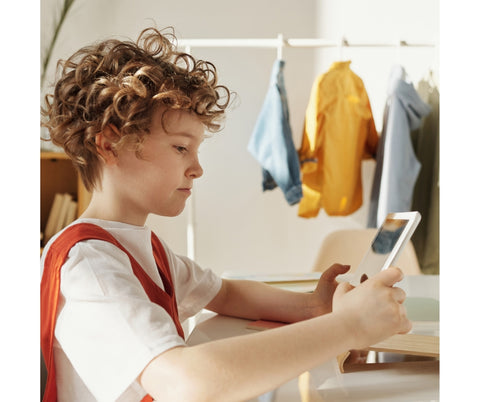
The Benefits to Parenting like it's the 80's and 90's
Share
In the 80s and 90s, parenting was much different than it is today. Children had more freedom to play outside and explore their neighborhoods without constant supervision. Screen time was limited, and parents were more hands-off when it came to discipline. While there were certainly some drawbacks to this parenting style, there are also many benefits to raising our kids like the parents of the 80s and 90s did.
One of the biggest benefits of this parenting style is that it fosters independence and self-reliance in children. When kids are given the freedom to explore their environment, they learn to rely on themselves and problem-solve on their own. This can help them become more confident and resilient adults. In contrast, children who are constantly supervised and sheltered may struggle with decision-making and problem-solving later in life. To elaborate: When children are given the freedom to explore their environment, they are able to engage in what psychologists call "self-directed play." This type of play allows children to use their imaginations, problem-solve, and engage in activities that interest them without adult guidance or direction. In self-directed play, children are in control of their own experiences, and they are free to take risks, make decisions, and learn from their mistakes.

Through self-directed play, children learn to rely on themselves and their own abilities to navigate the world around them. They learn to be self-sufficient and independent, which can help them develop a strong sense of confidence and self-esteem. As they explore their environment and try new things, they are also learning to problem-solve on their own, without adult intervention.
For example, when a child is exploring a new park, they may encounter obstacles such as climbing a tree or crossing a stream. Through trial and error, the child will figure out how to navigate these obstacles and find a solution that works for them. This type of problem-solving builds resilience and critical thinking skills, which are important for success in all areas of life.
Additionally, when children are given the freedom to explore their environment, they are able to develop a sense of spatial awareness and build physical skills such as balance, coordination, and agility. This can help them develop a sense of mastery and confidence in their physical abilities, which can translate into other areas of their lives.
Overall, when children are given the freedom to explore their environment, they are able to learn and grow in ways that are not possible through adult-directed activities. They are able to rely on themselves, problem-solve, and build confidence and resilience, which are all important skills for success in life. As parents, we can support our children's exploration by providing a safe and nurturing environment and allowing them the freedom to explore and learn on their own.
Another advantage of 80s and 90s-style parenting is that it allows kids to develop a sense of community. In the past, it was common for kids to play outside with their friends and neighbors for hours on end. This not only gave kids a chance to socialize and form bonds with their peers, but it also helped build a sense of community in the neighborhood. In today's society, where many families are isolated and disconnected from their neighbors, this type of community-building can be incredibly valuable.
Moreover, the parenting style of the 80s and 90s often involved less emphasis on formal education and more focus on play. While education is certainly important, play is also a crucial part of a child's development. Through play, kids learn important skills like communication, problem-solving, and creativity. When children are given ample time for unstructured play, they are more likely to develop these important skills, which can serve them well throughout their lives.
Another benefit of the 80s and 90s parenting style is that it often involved less pressure on children to succeed academically or in extracurricular activities. Today, children are often overscheduled with activities and pressured to excel in every area of their lives. This can lead to stress, burnout, and even mental health issues. In contrast, when children are given more free time to pursue their own interests and hobbies, they are more likely to find joy and fulfillment in their lives.

Moreover, 80s and 90s-style parenting also allowed for more unstructured family time. In today's busy world, many families struggle to find time to simply be together and connect with each other. In the past, it was more common for families to spend time together without any specific agenda. Whether it was going for a bike ride, playing a board game, or just hanging out in the backyard, these moments of togetherness can be incredibly valuable for families.
Another advantage of the 80s and 90s parenting style is that it often involved less reliance on technology. Today, children are often glued to their screens, which can lead to a host of negative outcomes, including poor sleep, decreased physical activity, and social isolation. When children are encouraged to spend more time outdoors, engage in physical activity, and interact with others face-to-face, they are more likely to develop healthy habits and strong social skills.

However, it is important to note that there were certainly some drawbacks to the parenting style of the 80s and 90s. For example, corporal punishment was more widely accepted, and there was less emphasis on emotional intelligence and open communication. As we move forward, it is important to take the best of what worked in the past and integrate it with modern parenting techniques to create a healthy and balanced approach.
In conclusion, while the parenting style of the 80s and 90s had its flaws, there were also many benefits to this approach. By giving children more freedom and opportunities for unstructured play, fostering independence and self-reliance, and encouraging family time and community building, we can help our children develop into well-rounded individuals with strong social skills, emotional intelligence, and a healthy relationship with technology. It is important to find a balance between providing structure and guidance for our children while also allowing them the freedom to explore their interests and develop their own sense of identity.
As parents, it is our responsibility to create a nurturing environment that supports our children's physical, emotional, and cognitive development. By taking the best of what worked in the past and integrating it with modern parenting techniques, we can provide our children with the tools they need to thrive in today's world while also instilling timeless values such as independence, community, and play.
Ultimately, there is no one-size-fits-all approach to parenting. Every child is unique, and every family has its own set of circumstances. However, by reflecting on the parenting styles of the past and considering how they might be adapted to modern times, we can develop a parenting style that works for our own family and supports our children's growth and development.
